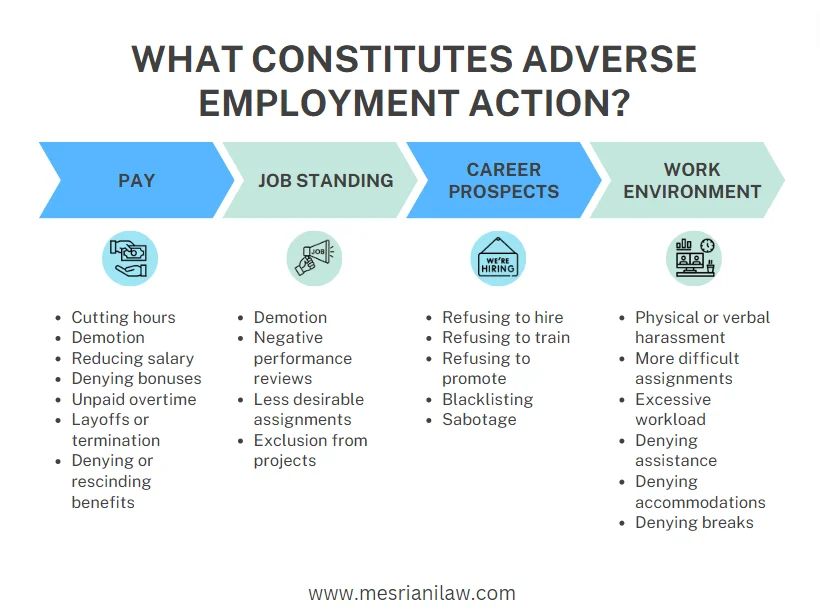An adverse employment action is essentially any actions taken by an employer that is a detriment to the terms, conditions, or privileges of someone’s employment. This concept is pivotal in employment law, as it helps determine the validity of claims related to discrimination and retaliation. According to the U.S. Court of Appeals for the Ninth Circuit [1], an action is deemed adverse if a reasonable employee would find it materially adverse, meaning it might dissuade a reasonable worker from making or supporting a charge of discrimination. In essence, adverse employment actions can range from severe measures such as termination and demotion to more subtle actions like reducing benefits, lowering rank, or hindering promotion opportunities.
Understanding what constitutes an adverse employment action is essential for both employees and employers. For employees, proving an adverse employment action is often a crucial component of establishing claims of unlawful discrimination or retaliation under various employment laws, including Title VII of the Civil Rights Act of 1964. Recent legal developments, such as the Supreme Court’s decision in Muldrow v. City of St. Louis, Missouri, have further clarified the standards for what constitutes an adverse employment action. The Court’s ruling indicates that an employee need not demonstrate a materially significant disadvantage to prove an adverse action, but merely show that the action resulted in some disadvantage at work. This broader interpretation highlights the importance of evaluating the specific circumstances of each case to determine if an action qualifies as adverse.
If your employment rights have been violated, call us today at (866) 936 7349 to schedule a free consultation
Do Adverse Employment Actions Involve Discrimination or Retaliation?
Adverse employment actions frequently occur in the context of discrimination or retaliation cases. When an employee experiences discrimination or retaliation, it often manifests as significant actions like termination, demotion, or suspension. These actions are clear examples of adverse employment actions as they directly and materially impact the employee’s job status and conditions. However, discrimination and retaliation can also take subtler forms like being systematically excluded from meetings, receiving unwarranted negative evaluations, or being passed over for promotions. These subtler actions can cumulatively meet the legal definition of adverse employment action if they create a sufficiently hostile work environment.
The distinction between discrimination and retaliation is crucial in understanding adverse employment actions. Discrimination involves adverse actions taken because of an employee’s protected characteristic like race, gender, or age. Retaliation, on the other hand, occurs when adverse actions are taken in response to an employee exercising their legal rights like filing a discrimination claim or whistleblowing. The legal standards for what constitute an adverse employment action can vary between these two contexts. For instance, while both types of claims require showing a materially adverse impact, the specific circumstances and nature of the action may be evaluated differently by courts. This distinction can significantly influence the outcome of discrimination and retaliation cases which highlights the importance of understanding the nuances in each situation.
What Law Makes Discrimination Related Adverse Employment Actions Unlawful?
Title VII of the Civil Rights Act of 1964 is the primary federal law that makes it unlawful for employers to discriminate against employees based on protected characteristics such as race, gender, religion, and national origin [2]. Under Title VII, discrimination is prohibited in any aspect of employment including compensation, terms, conditions, or privileges of employment. Although the term “adverse employment action” is not explicitly mentioned in the language of Title VII, it has been established through various federal court interpretations as any action that materially affects an employee’s job status or work environment.
Certain federal courts like the U.S. Court of Appeals for the Fifth Circuit have adopted a narrower interpretation that recognizes only ultimate employment decisions like hiring, firing, and setting compensation as adverse employment actions [3]. However, other courts and the EEOC advocate for a broader understanding that includes any materially adverse change in the terms of employment. This varying interpretations of what constitutes an adverse employment action has recently forced the Supreme Court to weigh in on the debate to clearly define what constitutes an adverse employment action.
What Recent Supreme Court Case Defined Adverse Employment Action in Relation to Discrimination?
The Supreme Court’s decision in Muldrow v. City of St. Louis, Missouri [4] significantly impacted the legal landscape regarding adverse employment actions in discrimination cases. In this case, Sergeant Jatonya Clayborn Muldrow, a St. Louis police officer, alleged that her transfer from a specialized unit to a more administrative role constituted an adverse employment action based on sex discrimination. Although her rank and pay remained unchanged, the new position involved less prestigious duties, a less predictable schedule, and the loss of certain benefits like FBI credentials and a take-home vehicle. The trial court initially ruled against Muldrow, citing the lack of tangible changes in salary or rank.
The Supreme Court, however, rejected the need for a “materially significant disadvantage” to prove an adverse employment action under Title VII of the Civil Rights Act of 1964. The Supreme Court ruled that an adverse employment action does not need to meet a heightened threshold of injury but must show some harm related to the terms, conditions, or privileges of employment. This decision marked a departure from previous interpretations that required substantial or significant harm and broadened the scope of what could be considered an adverse employment action, further strengthening employee’s rights. This ruling emphasizes that any disadvantage resulting from a discriminatory job transfer can constitute an adverse employment action, even if the harm is not substantial.
What Law Makes Retaliation Related Adverse Employment Actions Unlawful?
Title VII of the Civil Rights Act of 1964 also addresses retaliation and makes it unlawful for employers to retaliate against employees who engage in protected activities like filing a discrimination complaint or participating in an investigation [5]. The legal standards for retaliation are broader than those for discrimination. Any action that could dissuade a reasonable worker from making or supporting a complaint of discrimination can be considered an adverse employment action. This includes traditional actions like termination, demotion, and suspension, as well as subtler forms of retaliation such as “outing” a whistleblower or “blacklisting” a former employee.
The anti-retaliation provisions under Title VII and the Sarbanes-Oxley Act (SOX) ensure that employees are protected from materially adverse actions that would discourage them from asserting their rights. For example, even a lateral transfer with no change in pay or rank can be considered materially adverse if it results in less favorable job duties or a more inconvenient work location. The lower standard for proving retaliation emphasizes the importance of protecting employees from any retaliatory conduct that might deter them from reporting discrimination or participating in legal proceedings related to workplace issues.
What Supreme Court Case Defined Adverse Employment Action in Relation to Retaliation?
The Supreme Court’s decision in Burlington Northern and Santa Fe Railway Co. v. White, 548 U.S. 53 (2006) [6], is a landmark case that clarified the definition of adverse employment action in the context of retaliation. In this case, the Supreme Court established that an action is considered retaliatory if it would dissuade a reasonable employee from making or supporting a charge of discrimination. This definition introduces an objective standard of a “reasonable employee” while incorporating the concept of “materially adverse.” Unlike discrimination cases, where the focus is on changes in the terms or conditions of employment, retaliation claims can encompass a broader range of actions.
The court in Burlington Northern recognized that adverse employment actions in retaliation cases are not limited to ultimate employment decisions like termination or demotion. Instead, it includes any actions that could deter an employee from engaging in protected activities like lateral transfers, unfavorable references that affect a prospective employer’s hiring decision, and more burdensome work schedules. These actions, while not necessarily altering the terms of employment significantly, could still discourage a reasonable employee from pursuing or supporting a discrimination claim. This broader interpretation ensures comprehensive protection for employees against various forms of retaliation.
If your employment rights have been violated, call us today at (866) 936 7349 to schedule a free consultation
What Are Examples of Adverse Employment Actions?
The Equal Employment Opportunity Commission (EEOC), which enforces Title VII, has identified several examples of adverse employment actions that are unlawful when motivated by discriminatory or retaliatory reasons.
Examples of adverse employment actions include [7]:

What Legal Cases Helped Define Adverse Employment Actions?
Various legal cases have played a pivotal role in defining what constitutes adverse employment actions. These cases span a range of scenarios, from administrative leave to salary cuts, and provide a clearer understanding of the types of employer actions that can affect an employee’s job status and conditions.
Key legal cases that helped define adverse employment actions include:
- Dahlia v. Rodriguez (9th Cir. 2013) [8]:
- Employee’s placement on administrative leave, deprivation of ability to take promotional exams, and loss of pay and job opportunities.
- Little v. Windermere Relocation, Inc. (9th Cir. 2002) [9]:
- Cut in monthly base salary.
- Passantino v. Johnson & Johnson Consumer Prods. (9th Cir. 2000) [10]:
- Low rating on job performance review, decreased job responsibilities, and failure to receive promotions.
- Hashimoto v. Dalton (9th Cir. 1997) [11]:
- Negative job reference.
- Miller v. Fairchild Indus. (9th Cir. 1989) [12]:
- Layoff.
- Yartzoff v. Thomas (9th Cir. 1987) [13]:
- Transfer of job duties and “undeserved” performance ratings.
- Ruggles v. Cal. Poly. State Univ. (9th Cir. 1986) [14]:
- Failure to hire.
What Actions Have Been Determined to Not Be Adverse Employment Actions?
Not all workplace setbacks qualify as adverse employment actions under Title VII. Courts have determined that certain actions, while potentially frustrating or undesirable for employees, do not meet the threshold of materially and adversely affecting the terms, conditions, or privileges of employment.
Examples of actions not considered adverse employment actions include:
- Assigning unfavorable tasks that are still within the employee’s job description.
- Failing to nominate an employee for a workplace award.
- Sending an employee to counseling for poor workplace performance reviews.
- Adding a written reprimand to an employee’s personnel file.
- Stripping supervisory responsibilities without changing the employee’s position or compensation.
- Transferring an employee to a different city but maintaining the same title and salary.
- Threatening discipline or transfer in the future without following through.
Under the Fair Employment and Housing Act (FEHA), similar actions are also not considered adverse employment actions. These include:
- Oral or written criticism against an employee.
- Ostracism in the workplace, unless it amounts to harassment or creates a hostile work environment.
- Changes in the workplace that are not in the employee’s interests or preferences.
- Refusing to allow an employee to rescind a voluntary resignation.
- Threats of future adverse actions that are not carried out.
The key factor in determining whether an action is adverse is its severity and impact. Actions that are merely inconvenient or annoying do not typically qualify. For instance, minor schedule changes or negative performance reviews on their own are generally not considered adverse unless they are part of a pattern leading to more severe consequences like demotion or termination. The context of each situation is crucial, as even seemingly minor actions can be significant if they cause tangible harm.
What Legal Cases Helped Determine Which Actions Did Not Constitute an Adverse Employment Action?
Various legal cases have clarified what actions do not qualify as adverse employment actions, by establishing that not all negative experiences in the workplace meet the threshold for materially and adversely affecting employment conditions.
Examples of actions not considered adverse employment actions include:
- Brooks v. City of San Mateo (9th Cir. 2000) [15]:
- Ostracizing by co-workers.
- McAlindin v. Cnty. of San Diego (9th Cir. 1999) [16]:
- Refusing to hold a job open beyond the period dictated by the company’s leave policy.
- Nunez v. City of L.A (9th Cir. 1998) [17]:
- “Badmouthing” an employee.
These are just a few of the cases that demonstrate that certain actions do not constitute adverse employment actions unless they significantly impact the employee’s job status or working conditions.
If your employment rights have been violated, call us today at (866) 936 7349 to schedule a free consultation
How Does an Employee Prove They Suffered an Adverse Employment Action?
To prove that an employee has suffered an adverse employment action, it is crucial to demonstrate that the action significantly harmed their employment experience. This typically involves comparing the employee’s workplace conditions before and after the employment decision. Key aspects to consider include:
- Salary
- Hours worked
- Benefits
- Job title
- Work duties
- Prospects for promotion
Documenting these changes can help build a strong case. Establishing an attorney-client relationship with a lawyer from a reputable law firm like Mesriani Law Group can provide the necessary legal advice and representation to effectively prove that the working conditions have been adversely impacted.
How Does an Employee Prove a Discrimination Adverse Employment Action?
Establishing employment discrimination that is founded on intentional discrimination requires that an employee demonstrates the following:
- The employee is part of a protected class
- They experienced an adverse employment action
- They either met or exceeded the employer’s reasonable job expectations at the time of the adverse employment action
- Other similarly situated employees outside their protected class experienced different or preferential treatment
Once these elements are established, the burden shifts to the employer to articulate a non-discriminatory reason for the adverse employment action. If the employer provides such a reason, the employee must then prove by a preponderance of the evidence that the employer’s reason is merely a pretext for discrimination. This comprehensive approach helps ensure that the claim of discrimination is substantiated by clear and compelling evidence.
How Does an Employee Prove a Retaliation Adverse Employment Action?
To prove a retaliation adverse employment action, an employee must demonstrate several critical elements, particularly in cases like those under the Sarbanes-Oxley Act (SOX). The employee must show that:
- They engaged in protected activity
- They experienced an adverse employment action
- The employer was aware that the employee was engaging in a protected activity at the time of the adverse employment action
- The adverse employment action was a result of the employee’s participation in the protected activity
If the employee successfully shows these elements by a preponderance of the evidence, the burden shifts to the employer to prove by clear and convincing evidence that the same adverse employment action would have been taken even if the employee had not engaged in the protected activity. This framework ensures that retaliation claims are substantiated with solid evidence linking the adverse action to the protected activity.
Contact Mesriani Law Group If You Have Been Subject to an Adverse Employment Action
Both federal and California state laws protect employees from discrimination, harassment, and retaliation in the workplace. An employee cannot be demoted, suspended, or terminated due to being part of a protected class or as retaliation for engaging in a protected activity. Unfortunately, employers will still try to take adverse action against their employees even when legally prohibited. When this happens, the employee has the right to file a claim against them. There are many steps to take and time frames in which those steps must be taken. It can be overwhelming for anyone, especially when added to the stress of the ordeal itself. An employment lawyer can help navigate the process and alleviate that stress. The attorneys at Mesriani Law are experienced, hardworking, and dedicated to getting our clients the compensation they deserve. If you have faced adverse employment action from your employer, call Mesriani Law Group today for a free consultation.
If your employment rights have been violated, call us today at (866) 936 7349 to schedule a free consultation
Sources
[1] https://cdn.ca9.uscourts.gov/datastore/general/2021/02/09/Ninth%20Circuit%20EDR%20Policy.pdf [2] https://www.eeoc.gov/statutes/title-vii-civil-rights-act-1964 [3] https://www.ca5.uscourts.gov/opinions/pub/21/21-10133-CV2.pdf [4] https://www.supremecourt.gov/opinions/23pdf/22-193_q86b.pdf [5] https://www.justice.gov/crt/laws-we-enforce [6] https://www.justice.gov/osg/brief/burlington-n-santa-fe-ry-v-white-amicus-merits [7] https://www.eeoc.gov/laws/guidance/questions-and-answers-enforcement-guidance-retaliation-and-related-issues [8] https://cdn.ca9.uscourts.gov/datastore/opinions/2013/08/21/10-55978.pdf [9] https://caselaw.findlaw.com/court/us-9th-circuit/1480874.html [10] https://caselaw.findlaw.com/court/us-9th-circuit/1014374.html [11] https://caselaw.findlaw.com/court/us-9th-circuit/1188476.html [12] https://casetext.com/case/miller-v-fairchild-industries-inc-2 [13] https://www.casemine.com/judgement/us/5914c1f7add7b049347bc9fc [14] https://casetext.com/case/ruggles-v-california-polytechnic-state-univ [15] https://caselaw.findlaw.com/court/us-9th-circuit/1013868.html [16] https://caselaw.findlaw.com/court/us-9th-circuit/1277812.html [17] https://casetext.com/case/nunez-v-city-of-los-angeles
Adverse Employment Action FAQs
What are the most common examples of adverse employment actions?
The most common examples of adverse employment actions include termination, demotion, and reduction in pay or benefits. Other frequent examples are failure to promote, negative performance reviews, and reassignment to less desirable positions.
What is an example of an adverse action EEOC?
The EEOC (Equal Employment Opportunity Commission) plays a crucial role in protecting employees against adverse employment actions by enforcing federal laws that prohibit employment discrimination and retaliation. The EEOC investigates complaints, mediates disputes, and, if necessary, files lawsuits to protect employees' rights and ensure compliance with anti-discrimination laws.
What is an adverse employment action under the ADA?
The FEHA (Fair Employment and Housing Act) protects employees in California against adverse employment actions by prohibiting discrimination, harassment, and retaliation in the workplace. It ensures that employees can work in an environment free from unlawful practices by allowing them to file complaints with the Department of Fair Employment and Housing (DFEH), which investigates and enforces these protections.








